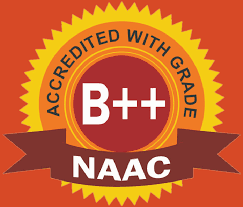Reaccredited by NAAC with  grade CGPA (2.89)
grade CGPA (2.89)

Sant Gadge Baba Amravati University, Amravati.
College code : 301
Reaccredited by NAAC with  grade CGPA (2.89)
grade CGPA (2.89)

E- Governance Policy

INTRODUCTION
The College has a policy
regarding E-governance policy to enhance governance through transparency,
interactions, transactions, and exchange of information among its stakeholders.
The college will implement e-governance in all aspects of its functioning, including
the library, accounts, admissions, administration, and teaching.
SCOPE
The policy's scope extends to the following areas:
•
Administration:
Implementing a centralized information system to provide real-time updates
on administrative decisions, policies, and activities.
•
Student admissions:
Creating an online portal for admission-related information, including
eligibility criteria, application procedures, and merit lists. Digitizing
student records for streamlined admissions management and ensuring data
accuracy.
•
Library management:
Implementing an e-library system to provide students and faculty access to
a vast digital repository of academic resources. Digitizing library catalogs and tracking user interactions to enhance resource
management.
•
Accounts and finance section:
Digitizing financial records, ensuring secure and accessible storage, and
automating financial reporting processes.
•
Communication and Reporting:
Implementing a robust communication system for seamless interaction among
stakeholders, utilizing channels like emails, messaging platforms, and official
websites. Generating regular reports on various aspects of college functioning,
such as academic performance, financial status, and administrative decisions.
OBJECTIVES
The e-governance policy aims to achieve the following objectives:
•
Implement e-governance in all
aspects of the functioning of the college to provide a simpler, faster and more
efficient governance system.
•
Minimizer paperwork to promote a
greener campus.
•
Provide easy access to
information for stakeholders.
•
Maintain data in a secure
environment.
•
Promote visibility of the
institution at global level.
•
Promote transparency and
accountability.
•
Achieve complete automation of
library and information services.
POLICY
Website and social media:
Administrators shall regularly update the website with accurate
information, ensuring that it reflects the latest activities, notices, and
course offerings. IT cell shall share relevant and engaging content on social
media platforms, highlighting the achievements, special lectures, and important
announcements.
Academic and Office (ERP System):
Administrators and Department Heads shall oversee the proper implementation
of the ERP system modules, ensuring efficient management of student records,
finance, human resources, courses, and evaluations.
Faculty shall utilize the teaching and learning modules effectively,
provide timely feedback, and ensure accurate recording of student
performance. Thus, streamlining
processes, improve productivity, and ensure accurate and timely management of
data and tasks.
Effective communication among stakeholders will be ensured through various
channels, including email, messaging apps, and a dedicated communication
platform as well as website.
Finance and Accounts:
Finance Department shall utilize the ERP system for budgeting, accounting,
and financial reporting, ensuring accuracy and transparency in financial
management.
Administrators shall oversee proper control and monitoring mechanism in all
administrative aspects like allocation of funds and other resources, financial
planning based on the reports generated by the ERP system. Section heads and
concerned employees will report the requirements from the ERP system and get
the necessary changes/updates done from the vendor.
Library Management:
Librarian shall ensure complete automation of the functions of the library
and the management of learning resources through library management system,
college website and the other equipment/software. Accession, display, listing
and generation of reports are to be fully automated. Issue/return of books and
sharing of digital resources shall also be ensured and made fully automated.
Librarian and Library Advisory Committee shall work to achieve this and
also ensure sharing and exchange of knowledge resources with other libraries in
the country and the world by making the library a part of the other library
networks.
Feedback:
The College shall collect regular feedback and suggestions from Students,
Parents, and Alumni, through the online system available on the website,
contributing to continuous improvement of academic and administrative
processes. Feedback analysis committee
shall analyse feedback data and ensure suitable implementation to enhance the
overall quality of functioning of the college.
IT Security and Connectivity:
IT Cell of the college shall install and maintain latest antivirus
software, secure firewall systems, and oversee Wi-Fi networking and LAN
connectivity to ensure a secure and reliable digital environment. A dedicated technical person shall be
employed for this.
With the help of this policy, the
college aims to create a secure and transparent environment where each
stakeholder can have easy access to facilities and resources in a fair and
secure manner.